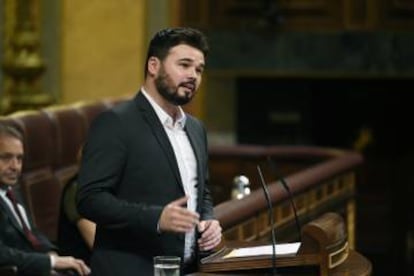Spanish Congress takes first step to change controversial ‘Gag Law’
But opposition divided over what should replace ruling conservatives’ Citizen Safety legislation
Spanish Congress has agreed to debate two bills introduced by the Socialists and by a Basque regional group that seek to modify Spain’s controversial Citizen Safety Law – better known to its critics as the “Gag Law.”

This law came into effect in July 2015, back when the conservative Popular Party (PP) enjoyed an absolute majority in parliament, despite widespread rejection from opposition parties and many sections of society.
At the time, the opposition accused the government of creating “a police state” because the new legislation gave law-enforcement officers the power to hand out sanctions that had previously been the sole preserve of judges. The law was also seen as a way to curtail public protest at a time when Spaniards were demonstrating against economic hardship and political corruption.
The PSOE has this urge to repeal that is more focused on grabbing headlines than on effectively protecting liberties
Miguel Gutiérrez, Ciudadanos
On Tuesday, Socialist congressman Antonio Trevín described the law as “pure authoritarian paranoia.”
The weakness of the PP’s current minority government was evidenced once more yesterday, when Congress agreed to consider bills put forward by the Spanish Socialist Party (PSOE) and the Basque Nationalist Party (PNV) to substantially reform parts of the “Gag Law,” particularly the sections that have been appealed before Spain’s Constitutional Court.

It will be a long parliamentary procedure of uncertain outcome, however. Opposition parties cannot agree on just how much of the law’s wording should be changed, and the PP is ready to negotiate in order to minimize the effects of the modifications.
“This is a manipulated and recurring debate, because not only does this law not attack fundamental rights, it actually protects them,” said PP congressman José Alberto Martín-Toledano, speaking at the podium on Tuesday.
Following the vote yesterday, a period of partial amendments is now opening up. In the best-case scenario, the reform process will be completed late this year or in early 2018.
Symbolic value
Last November, Congress approved a non-binding resolution introduced by the Socialists that asked for a reform of the Citizens Safety Law. That vote had purely symbolic value, although it did serve as a gauge of political sentiment in the lower house.
The current effort, by contrast, is legally binding. But opposition parties are divided as to what aspects of the law need to be amended or repealed altogether.
An earlier controversy
The 1992 Citizen Safety Protection law was passed when the Socialists were in power, under then-Interior Minister José Luis Corcuera. That law was also controversial back in its day, and dubbed the “Kick-Down-The-Door” law because it allowed the police to enter homes without a warrant during drug crime investigations. That aspect of the law was later struck down by the Constitutional Court.
The PSOE wants to scrap the legislation and effectively go back to an earlier citizen safety law from the early 1990s (see sidebar).
But the PNV wants to maintain most of the law as is, while amending 44 sections to guarantee rights and liberties and eliminating the items that have been appealed before the Constitutional Court.
“Your texts are at odds with each other,” said Martín-Toledano to PSOE and PNV representatives.
Meanwhile, the leftist Podemos disagrees with both this law and the previous one. It also opposes the 2013 reform to the Penal Code and a PP-PSOE jointly sponsored expansion of the definition of terrorism.
Gabriel Rufián, of the small, pro-independence Catalan Republican Left (ERC), called the current law “one of the dirtiest tricks played by that reactionary machine known as the PP.”
And sitting in the middle, the reform party Ciudadanos – which has reached broad policy deals with both the Socialists and the PP at various times – abstained when the PSOE bill was voted but supported the Basque initiative.
“The PSOE has this urge to repeal that is more focused on grabbing headlines than on effectively protecting liberties,” said Ciudadanos representative Miguel Gutiérrez.
English version by Susana Urra.
Tu suscripción se está usando en otro dispositivo
¿Quieres añadir otro usuario a tu suscripción?
Si continúas leyendo en este dispositivo, no se podrá leer en el otro.
FlechaTu suscripción se está usando en otro dispositivo y solo puedes acceder a EL PAÍS desde un dispositivo a la vez.
Si quieres compartir tu cuenta, cambia tu suscripción a la modalidad Premium, así podrás añadir otro usuario. Cada uno accederá con su propia cuenta de email, lo que os permitirá personalizar vuestra experiencia en EL PAÍS.
¿Tienes una suscripción de empresa? Accede aquí para contratar más cuentas.
En el caso de no saber quién está usando tu cuenta, te recomendamos cambiar tu contraseña aquí.
Si decides continuar compartiendo tu cuenta, este mensaje se mostrará en tu dispositivo y en el de la otra persona que está usando tu cuenta de forma indefinida, afectando a tu experiencia de lectura. Puedes consultar aquí los términos y condiciones de la suscripción digital.








































